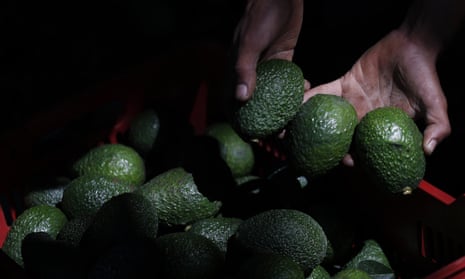Avocados are an approximately $2.3bn annual export for Mexico, with the majority of the creamy fruits growing in Michoacán, a mountainous, western region with rich, volcanic soil. But Michoacán is not only Mexico’s fruit bowl: it is also a stronghold of the country’s drug cartels. Earlier this month, cartel gunmen there massacred 14 police officers in an ambush.
Cartels reportedly collected over $154m of Michoacán’s annual avocado profits between 2009 and 2013, extorting local farmers through threats of kidnapping, rape and gruesome violence, which continues to escalate. Gangs have been known to charge farmers a $60-per-acre tax on their own farms and a fee for every box of fruit they produce; sometimes they even seize their land. Periodically, vigilante groups organize to fight back, but the region’s local institutions are weak and the cartels are strong.
As you’d probably expect, avocado enthusiasts, not wanting to inadvertently fund violence, have begun to have second thoughts about the ethics of their favorite toast-topper. The Guardian reported last year on the decision of several restaurant owners and chefs, including the Michelin-starred Irish chef JP McMahon, to drop Mexican avocados from their menus. McMahon likened the fruits to blood diamonds, and the London chef Joseph Ryan has welcomed a “post-avocado era”.
But there’s a problem: boycotting Mexican avocados is probably not a good way to fight the cartels.
“This notion of asking consumers to stop buying avocados because farmers are suffering extortion from organized crime is kind of like punishing the victim even more,” Rodrigo Canales, a Yale School of Management associate professor, told me during a 2016 interview.
Canales studies the wider implications of the Mexican war on drugs. “Boycotting avocados,” he argues, “would be the worst thing we could do for people who are suffering the most.”
Should avocados become unprofitable, cartels can simply diversify, following stronger revenue sources and leaving farmers ruined, only to return if and when business picks up again. Plus, Michoacán exports limes, strawberries, mangoes and a variety of other produce; to blacklist avocados is arbitrary when most of the region’s lucrative agricultural production has been infiltrated by cartels in one way or another.
If we want to sap the cartels’ strength, there are better ways to do so.
One reason cartels are able to effectively intimidate farmers is because they wield military-grade weapons legally purchased in the US and smuggled across the border. According to the Bureau of Alcohol, Tobacco, and Firearms, a significant number of firearms recovered from cartels originated in US stores; some estimates suggest gunrunners move a quarter of a million guns over the southern border each year. As Rolling Stone reports, a 2013 University of San Diego study found that “nearly half of all gun stores in the United States would go out of business were it not for the sales boost provided by the carnage in Mexico”.
Trump’s border wall and tightened immigration policy have also been a boon to cartels, who are able to charge more for complicated, high-stakes human smuggling operations. As the New York Times reports, “Strengthening defenses does not stop smuggling. It only makes it more expensive, which inadvertently gives more money to criminal networks.”
Taking action to strengthen gun laws and end the US immigration crises would accomplish far more than boycotting avocados. You can also, it bears mention, not buy drugs. Drug sales in the US account for $19 to $29bn of the cartels’ annual revenue.
Granted, guns, immigration and drugs are massive socio-political issues. Fortunately there are more specific and accessible ways consumers can support ethical avocado farming as we wait for institutional change. You can buy from farmers doing their best to operate outside cartel influence, like those of the Michoacán growers collective Pragor. Pragor’s avocados are fair trade, organic-certified and identifiable by the presence of an Equal Exchange sticker.
Buying environmentally friendly fruit is also important because of evidence that the Michoacán avocado trade has contributed to local deforestation and the destruction of butterfly habitat.
The somewhat higher cost of ethical avocados is a small price to pay for enjoying guacamole with a clean conscience.
Adrienne Matei is a journalist who writes on subjects including technology, culture and food.
